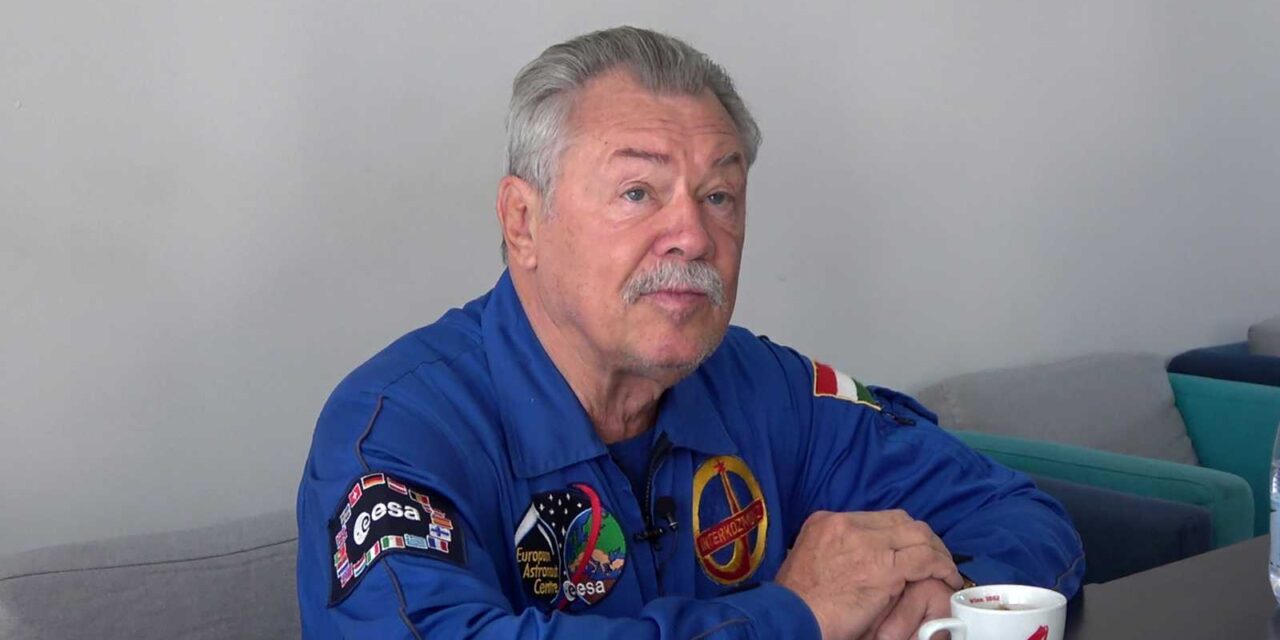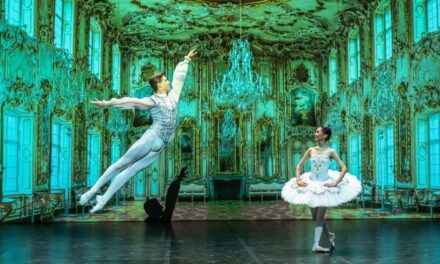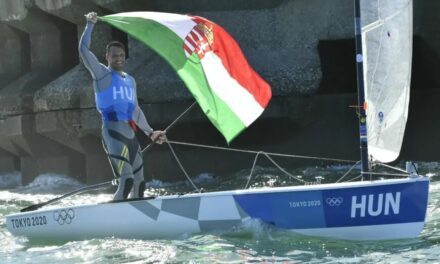I also see posters in Budapest that say the Earth is flat. All I can add to this is that in one day, i.e. 24 hours, I went around this "flat earth" sixteen times. Interview with Bertalan Farkas.
At the invitation of the Wegener Pro Sanitate Foundation, Bertalan Farkas, the only Hungarian who has been in space, gave a lecture in Kézdivásárhely.
You visited Kézdivásárhely sixteen years ago, how did it feel to return to the guild town?
It is an honor for me to be here again, I have been to countless places, and I was received incredibly kindly here then and now. I felt that they were proud that the first Hungarian astronaut also visited the city, and I think that the friends I met then will meet me with the same love. This covid thing messed me up a bit, I also planned to visit my friends every few years. This region is wonderful, I was staying with a friend, when I looked out in the morning I felt this fresh air, I saw the amazing panorama.
I made one mistake among many, because when I came back from outer space, I said that if people's interest remained, then I would always be a partner. 43 years have passed, and this interest has not decreased, but has remained and increased, so it is difficult to satisfy everything. The good thing about this is that I always meet new faces, including young people, who are the most important to me. I apologize to the older people, but the future belongs to the young, they must somehow be convinced that everything we do was not bad, what we do for the future must be good, because in this vast universe a we want a peaceful life for posterity.
Recently, the Hungarian government announced that another Hungarian will soon go into space. Why is this important?
The truth is that I wanted to go to space again because I liked it so much and it was so wonderful. Those eight days, whether you like it or not, were a lot at that time, but there should have been a continuation, since I was 31 years old at the time, at that age you don't have to end your life. But it didn't turn out that way, I think everyone knows the political situation, the Soviet Union fell apart.
It was one of my dreams, but since I couldn't make it happen in practice, I dreamed that there would be a next Hungarian astronaut and how wonderful it would be if I were still alive and could help in the preparation.
It seems that the current government has given us the opportunity to participate in this program and become another Hungarian astronaut. The selection took place and was successfully completed. It looks like there is a doctor and three engineers, of which two will remain after another selection and at the very end one person.
What is very interesting is that when we were selected from among the fighter pilots 45 years ago, there were about 220 of us, one of whom went into outer space. Now 243 people applied, roughly the same number, so history repeats itself. Now, out of 243, there were 26, then eight, and there are currently four left. In our case, there were 95 of the 220 who volunteered, 27 of us remained, then 11, seven, four, and finally me and Béla Magyari.
I think that the great enthusiasm among today's young people is a very good thing, because anyone who is able to get close to space research will think about the fact that there are very wonderful things that are worth working and studying for.
Learning is the most important thing here. I don't begrudge today's young people, but in their case, learning and even reading are not the same as what, say, those of my age received in our childhood. It's true, there was no other option, there was no smartphone, we didn't have a laptop.
We operated completely differently. During a friendly conversation, if there were eight or ten of us, we talked, exchanged opinions, talked about everything we liked. Today, dozens of people are sitting at the same table and it is shocking that they are talking to each other via smartphone. This is quite a strange thing, but it is what it is, you have to accept it. But if we manage to guide these young people on the right path - including parents and grandparents, teachers and the environment - then this can change.
I think the most important thing for a young person today is that the environment they are in does not take them in a direction that is not very fortunate for them.
I always tell my own example, since I didn't want to be either a fighter pilot or an astronaut. But I got an opportunity, I fell in love with it, I started to love flying and from there I went down into outer space. Obviously, it involved a lot of resignations, a lot of things had to be met, which obviously I didn't even think about when I was a child. That's why I tell young people to dare to dream, to think about "what if". Of course you need luck, I'm not disputing that. Regardless, persistence, attitude, and will mean a lot.
You have been in space, recently Elon Musk, the founder of Space-X, claimed that he will reach Mars in three to four years. What do you think about this?
It is clear that the technical progress is enormous. However, I believe that the moon should be aimed first, even though it is closer. If we can provide living conditions for living organisms and humans on the Moon, then we can move on to Mars. Let's not start with what is perhaps still very, very far away for us, but with our companion celestial body. Technical development is currently significantly ahead of human thinking. I'm sure there will be a reconquest of the Moon, followed by Mars and the others.
As unbelievable as it may seem, there are those who believe that the Earth is flat. A frivolous question follows: have you been to outer space, how "flat" is our planet?
This thing is really unbelievable, even in Budapest I see posters on which it is written that the Earth is flat. The person who invented all this might say yes... All I can say is that in one day, i.e. 24 hours, I went around the "flat earth" sixteen times. I don't know how to get around the flat earth, but we can get around the spherical one, which is ours. So I can only answer these types of questions with a smile. Our planet - as the Americans made us aware of the surface of the moon at the time - was never flat.
István Tőrös' book about you was published in 2020. What do you need to know about this publication?
At that time, we had a huge idea that my life story should be written. It was written in Hungarian (On the way to the stars - Bertalan Farkas, the first Hungarian astronaut), but after traveling the world we realized that it might not be enough on its own, so it was written in English and Russian as well. I think that it should be supplemented now, because this current publication is about space flight, about my work in outer space. During the 43 years, a lot has happened to me, this might appear in a second, expanded edition. The demand is there, I just need to make time for it...
Behind the scenes of spaceflight
Bertalan Farkas gave a two-hour lecture in the conference room of the Atrium Hotel. The invitees were greeted by Kinga Bakk Vitalís, director of the Wegener Pro Sanitate Foundation, and Zoltán Balogh, secretary of the Hajduság Regional Club of the Vega Astronomical Association. "We have great news - Hanna Sárkány and I read it last week on the website of the Sapientia University in Csíkszereda, and we immediately thought: we must not miss this huge opportunity. At the last Tudástár presentation, we did not dare to announce today's extraordinary event, because Hanna Sárkány, the program manager of the Wegener Pro Sanitate foundation, worked hard in the background with Mr. Zoltán Balogh to make today's meeting possible," said the president of the foundation, who Bertalan Farkas gave his projection-image presentation.
The brigadier general first outlined how the step-by-step conquest of space began, and then moved on to how he got a place and a role in the Soviet space program alongside the representatives of the former CSTO countries. He described in detail the preparation, the arguments that erupted with his wife due to space travel, the time spent in space and the moment of their return, which did not go smoothly. In "kitchen language", he explained the main technical information and the experiments he performed on the Salyut-6 space station, which he reached with the help of the Soyuz-36 spacecraft and returned to Earth with the Soyuz-35 on June 3, 1980. .
At the end of the performance, Mayor Tibor Bokor also greeted the invited guests, handing over Kézdivásárhely's Képes Album as a gift. At the end of the performance, Bertalan Farkas autographed his biographical novel and signed the flyers of the event.
Featured image: Maszol/Imre Nagy













